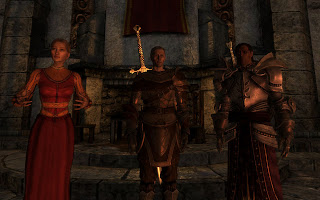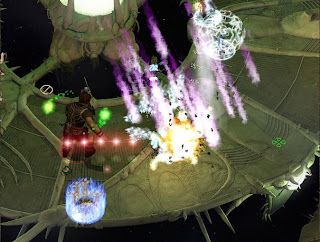As for small details, that's relevant to what I was trying to do for over an hour today, which was to get guards to stand at attention or salute as you walked past. I thought this would be a relatively simple process of overriding ambient behaviour (and a scripting command exists for this), but as I posted in this thread, I couldn't get it to work. Hopefully someone will be able to figure out what I'm doing wrong - I've already spent a significant amount of time on something that in all honesty won't add a lot to the experience of most players. Yet it's those small details I love seeing in games.
When it comes to backstory, I find myself putting in a lot of effort for characters, particularly major characters within a story. There is a lot of work that is going into creating the backstories for the party members and the major NPCs within The Shattered War, and I can almost guarantee that not all that information will make it into the final set of dialogue. Additionally, just like in the main campaign, there are likely to be some bits of information that you find out in mutually exclusive choices. As an example, a point in the main campaign of Dragon Age where you question Alistair about the Grey Wardens comes to mind - you can potentially ask him if there were any elves or women with the Grey Wardens. You can only ask one of these questions before he'll start relating a story about another character, making a small and subtle difference possible in your interaction.
Alistair reminisces about getting drunk
Now, the funny thing is that this doesn't really add much in terms of the character's development, but merely provides a more natural flow of conversation and a small variance in your experience. But having a large number of these throughout a game make for a more organic interactions and individualise the experience for players. I know I've discussed this before, but what if designers divulge different aspects of a character's past or experiences based on the choices a player makes? It's not a matter of withholding information, but merely making a more "realistic" representation of the interactions between two people.
Let's take a hypothetical real-world situation as an analogy. Say you have a group of three friends. It is unlikely that two of the friends will know exactly the same information about the third, though there will be some key information to which both will be privy to. However, the might be some secrets that one will know and the other will not, and vice versa. Who is to say that NPCs in a game should not react in the same way? Perhaps based on a player's choices, they will see different facets of a character than if they had chosen differently, offering an individualised experience for each player. Moreover, it could offer significantly different experiences on repeat playthroughs. This isn't about changing a character's persona, merely exposing the player to different facets of it based on their choices.
Three... let's go with "acquaintances"
However, what if we did take this a step further and allowed the player to influence a character's personality? I'm not simply talking about the ability to make someone a jedi like in Knights of the Old Republic 2. Or going a little bigger, something like David Gaider's Ascension modification for Baldur's Gate 2: Throne of Bhaal. This allowed you to get the monk Balthazar to support you in the climactic battle against the final boss(es) provided certain criteria were met. Actually, Alpha Protocol is probably one of the best examples of this idea, as you can have some greatly different experiences based on many decisions, and can potentially end the game with a great number of allies, or simply a massive body count. There are also several boss fights which can pit you against different opponents (or change their abilities) based on your choices. The idea that through your actions you can turn an adversary into an ally (or vice versa), is something that definitely appeals to me.
Death by spell barrage in Throne of Bhaal
Imagine a short game that is a murder mystery that plays out different based on your actions throughout the game. Everyone has a motive for murder, but through your actions and prodding, one of the characters finally decides to take that plunge into the darker side of nature. I'm reminded of a quest in Oblivion which was a "reverse murder mystery" where you could prod the entire house into murdering one another through your actions. But imagine if instead of being a sidequest, that level of control was woven through the major plot of the game. Maybe I like to meddle too much in the affairs on NPCs in a game, but I'd love to be able to affect the development of major NPCs in a game.







I have to say I agree with most of what you said here. I like giving the player choices, but I also want those choices to mean something. Your example of AP was great. (I don't know how many full playtroughs you've finished, but you have it very close to the mark.) For example, my first playthrough of AP ended up with two of my former enemies helping me kill my former friends, while in the second playthrough I massacred all but one character. The final boss fight was even different, as I freaked someone out enough that they left the battle before it started.
ReplyDeleteI know who those three "acquaintances" are! HAH!
ReplyDeleteDanien, you tease. You working on this? Weren't you also of the Alley of Murders team?
ReplyDelete